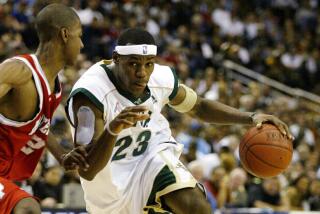Teen Holds Own in Koran Memory Test
- Share via
His turn didn’t come until the seventh day of competition, but the high school sophomore from Inglewood said he was just as happy he wasn’t asked to recite a randomly chosen portion of the Koran on the first day.
“I was scared on the first day,” said Ahmed Mohiuddin Nadvi, “but I calmed down after being there for a few days.”
The place was Mecca, Saudi Arabia, at the seventh annual international Koran recitation competition. Ahmed was there largely because of a family tradition of memorizing all or most of the Koran, the 6,662-verse holy book of Islam.
Born in India but now a student at Inglewood High School, Ahmed not only has had to learn English over the last two years, but he had been practicing an average of two hours daily chanting the Arabic scriptures with the precise intonation and pronunciation that judges demand.
Asked if the exactness expected was something like the judging of ice skaters doing compulsory figures, the reserved teen-ager nodded.
Ahmed, who recently turned 16, placed sixth in his category despite the fact that nearly all of his 85 competitors were adults. A total of about 250 males from the Islamic world competed at the tournament in February. The toughest of five categories tests memory of verses from any place in the Koran plus explanation of a selected portion.
Though Ahmed said he knows the first two-thirds of the Koran, he said he chose to enter the class in which competitors are called upon to recite verses from the first one-third of the book. He had finished first in the “one-third category” in December at the North American contest held in Chicago.
Ahmed came back from the all-expenses-paid trip to Saudi Arabia with prizes, mementos and about half of his 8,000 Saudi riyals prize money (about $2,500). “I spent about half of it in Saudi Arabia on gifts for myself and my family,” he said.
He traveled with his father, Mohammad Ghouse Nadvi, who served as one of eight judges (but who sat out the judging when his son’s turn came). The senior Nadvi has been director and imam, or spiritual leader, of the Jamat-e-Masjidul Islam mosque in Inglewood for the last four years.
Indian, Pakistani, Burmese and Middle Eastern Muslims make up most of the membership of the 400-family mosque. Friday prayer services also attracted Los Angeles Lakers stars Kareem Abdul Jabbar and Jamaal Wilkes several years ago. A number of Malaysian Air Force servicemen who train at nearby Northrup University also go to the Inglewood center.
The Nadvis are from Hyderabad, India, where the senior Nadvi taught at Islamic University. The imam, hired to head the California mosque, said the tradition of learning the Koran by heart is 400 years old in his family. He said he had memorized the Koran by age 11.
Ahmed is following more in the footsteps of his younger brother, Mohammad, now 14, who also won the one-third class in the North American competition the previous year, then placed seventh in the international contest.
But if the sons are in awe of any of their contemporaries living in this country, it may be the daughter of an immigrant family, originally from Hyderabad and living in Chicago. They said she can recite the whole Koran at the tender age of 10. So far, however, the recitation competitions have not been opened to female contestants.
A committee of New Testament scholars has launched a study to vote on what Jesus probably said and didn’t say--even if the Bible said he did.
Educator-author Robert W. Funk, formerly with the University of Montana, held the first “Jesus Seminar” meeting recently in Berkeley with 21 scholars.
The group’s purpose is to demonstrate the results of biblical critical research rather dramatically by studying, discussing and voting at periodic meetings on how likely each teaching attributed to Jesus originated with him or with the later church or gospel writers.
“Scholars have not fulfilled their obligations to report their work to a broader public,” Funk said. “My assumption is that there are a lot of people who care what Jesus actually said. (Preachers) on radio and television take the initiative away from us.”
Elliott Mason, pastor of the 3,500-member Trinity Baptist Church in Los Angeles for 26 years, was succeeded this week by 34-year-old Dumas Alexander Harshaw Jr.
Harshaw, who has master and doctor of ministry degrees from the School of Theology at Claremont, served as an assistant pastor to Mason since 1979. Harshaw also was president of the Interdenominational Ministerial Alliance of Los Angeles from 1981-1983.
Mason, 63, said he told his congregation in 1983 that he would retire this year. He said he is involved in a “prayer ministry” of support for pastors and missionaries around the world.
Rabbi Paul Dubin, executive vice president of the Board of Rabbis of Southern California, has been elected president of the multifaith Interreligious Council of Southern California. The organization facilitates contacts between representatives of major Christian churches as well as Jewish, Islamic, Buddhist, Hindu, Sikh and Bahai institutions based in Los Angeles.
More to Read
Sign up for Essential California
The most important California stories and recommendations in your inbox every morning.
You may occasionally receive promotional content from the Los Angeles Times.













